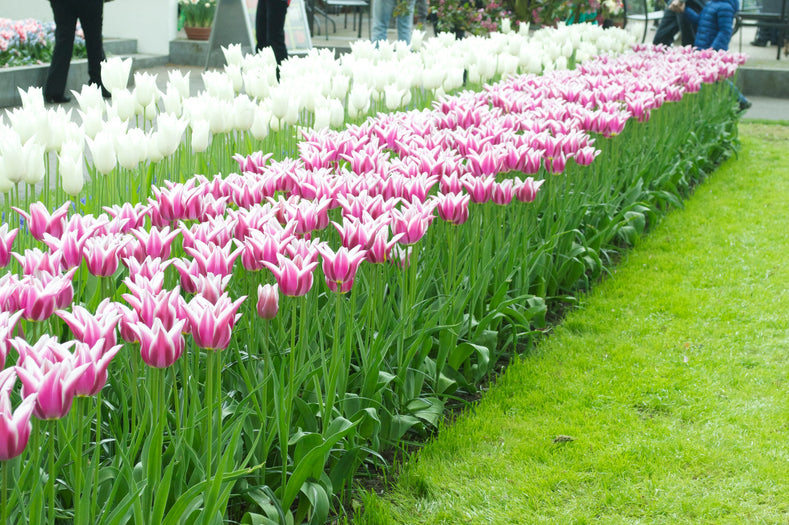Lily-flowered Group tulips are deservedly popular. They are tall and elegant with slim-waisted flowers and elongated petals. If I were only allowed to grow one tulip it would have to be a Lily-flowered Group tulip.
Their flower shape is reminiscent of the so-called needle flowered tulips; the pride of the Ottoman Empire in sixteenth century Turkey. Their modern-day equivalents are no longer delicate collectors items but vigorous garden plants that bring sophistication to any planting scheme they are added to.

But if I were really only allowed to grow one tulip I would not hesitate to choose ‘Ballerina’, a bold orange Lily-flowered jewel. However, this is not the sort of orange of street workers jackets, but more of barley sugar sticks. The official description of Tulip ‘Ballerina’ reads like a promotional advertisement: ‘Exterior flamed blood red on lemon yellow ground with orange yellow veined edge; inside, feathered marigold orange with capsicum red, buttercup yellow star shaped base, anthers pale golden yellow. Height 55 cm.’
If this were not enough, ‘Ballerina’ is strongly sweetly-scented which is unusual in this particular group of tulips.
As an ode to its heritage I regularly plant ‘Ballerina’ with the wild species Tulipa acuminata that resembles, albeit loosely, the original needle tulips of Turkish Sultans. Their red, orange and yellow colours of these two fine tulips complement one another perfectly.
Lily-flowered tulips are not for using as bold blobs of colour in the garden landscape, but rather as elegant members of a carefully planned garden border planting scheme. Most are fairly tall, between 55 and 65 centimetres, which is useful for late-season tulips being grown in the midst of mixed borders.
I tend to plant only one Lily-flowered tulip in any scheme as their individual refinement tends to compete one with the other. There is the glorious purple flowered ‘Burgundy’, for example, but it would simply fight for attention if mixed with ‘Ballerina’. A more appropriate companion for my favourite would be ‘Blue Parrot’ with its gentle violet-mauve tone and slightly ruffled, informal petals.
In addition to rich ‘Burgundy’ there are other good Lily-flowered cultivars in the same colour range to consider. Two in particular with pale edges to their petals affording them a sparkling, two-tone impact: ‘Maytime’ is reddish violet with a narrow creamy white margin and ‘Ballade’, the more dramatic, with magenta purple petals edged with a clean white margin.

When it comes to red tulips (see my earlier blog post) one of the very best is ‘Red Shine’ and not only because it is a Lily-flowered Group tulip. The red colour is deep, dark and radiant, especially when seen in full sunshine. Such a red tulip is indispensable in many spring gardens. Red stands out boldly and I always advise using red tulips in broad sweeps throughout the garden to bring that first splash of colour there at the end of the long dreary winter.
‘Jacqueline’ is the best pink, deep and glowing. The flowers are large and it is one of the tallest here, 65 cm. Although dramatically beautiful its character is quite different to ‘Red Shine’. I would place it carefully in more enclosed and intimate corners of a garden.
More intensity is offered by ‘Mariette’ that is officially recorded as being salmon rose. This perky, redder pink cultivar will shine out of any border it is used in. I recall visiting a garden where one large area was awash with Tulip ‘Mariette’; not mass planted, but spaced out generously between the other plants there—it was stunning.

One of ‘Mariette’s offspring has proven to be extremely popular both as a garden border plant and as a container plant. ‘Marilyn’ has bright white flowers crisply flamed in a deep fuchsia red.
Without doubt ‘West Point’ is the best known Lily-flowered tulip of them all. The pure yellow flowers are not held as tall as many others and when the sun shines, they open very flat and wide, hovering like drones across their planting area.

To end this survey of one of the most important groups of tulips from a gardener’s point of view, we need to consider ‘White Triumphator’. It reaches 60 cm. tall and the flowers, pure white, are large. In spite of this it resists the worst of weather and remains effective in the late spring garden for many weeks. This distinguished tulip stands out wherever it is used. It can work formally when placed at regular intervals throughout garden areas. It is equally effectively when doted here and there throughout the depths of mixed border;, its height allowing it to stand proud of its surroundings. Proud and sophisticated typify its character.
‘White Triumphator’ is without doubt the best white garden tulip and indeed maybe one of the best white flowers available to gardeners in any season.

